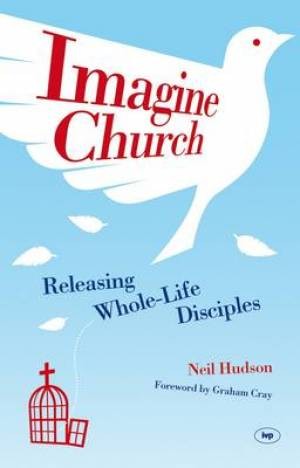UK Church: The problem and the solution
Sam Hailes
Neil Hudson has spent the last six years re-imagining how Christians might do church in the UK. Working for London Institude of Contemporary Christianity (LICC), which was founded by the late John Stott, Neil believes a major culture shift is needed across all the major denominations. The aim is to make what Neil describes as “whole life disciples”.

1. What is LICC all about?
In its DNA is about how we enable believers in Jesus who take seriously the call of the gospel, to understand the implications for that for their everyday life wherever they may be.
So it’s not simply about their personal life or home life or church life but about the whole of life. When we sing and say 'Jesus is Lord', that has a profound implication for how we view our businesses, the way we view our spending and everything. The whole of the culture shifts because we believe Jesus is Lord.
2. What’s the problem you have identified in the church?
I think we’ve all settled for less. People in the pew have settled for the fact that faith is personal and private, and what they do in terms of work is incidental. The primary way they are going to get involved in mission is through gathered church activity.
Church leaders have settled for less because they’ve seen the burden of mission on their own shoulders therefore they need to recruit people’s time and that’s frustrating for church leaders.
Most of us don’t live in the gathered church, we live scattered lives. In the 168 hours of the week most people can’t give more than 10 hours a week to gathered church activities.
It’s about recognising your primary identity as a disciple. The context in which you’re living and working is the outworking of what that means. So for the pensioner that will be different than the executive than it will be different the child at school.
It’s not simply about how do we evangelise better at work, it’s about does work matter at all? We believe good work has value for God so people need to understand how that fits because that will help them understand their own identity in Christ so it will flow.
3. Is this problem widespread across all UK churches?
It seems to be. There doesn’t seem to be a stream that says we’ve solved this. From Catholic and high Anglican all the way through to Newfronties and Vineyard, people would say we struggle with this. This is cross denominational.
4. How did you get involved with the Imagine Church project?
Mark Greene in 2003 wrote an essay called 'Imagine how will we reach the UK’ and he diagnosed two problems. He said that on the whole the problem has been that we’ve lived too long with the sacred-secular divide, and we haven’t been great at apprenticing people in the ways of Jesus.
It’s one thing to diagnose a problem it’s another thing to say what’s the solution so LICC asked me if I would work with a number of churches to learn from them about what does it look like when you tinker with this culture.
The book is the outworking of the lessons we’ve learnt while we’re working with those initial churches.

5. Who is the book for?
Church leaders or people who were passionate about the church but have a feeling that the machinery of the church sucks us dry and there must be more than that.
It’s a book that gives people practical stories and practical pointers as to what you can do but I think it comes out of a deep love for the church and that’s the important thing.
We live in an age where a lot of people knock the church and say we ought to give up on it and I believe quite the opposite actually. Bill Hybels writes 'the local church is the hope for the world'. How do we see that and what is our local church doing in terms of equipping people to see that?
6. What are the implications of this for the way we see leadership in the church?
For many people their understanding of ministry is you are effectively a professional carer whereas what I want to suggest is the role of the ministry is one of equipping people that they might make a difference.
Where caring becomes important is we become a caring community where we care for one another but we don’t pay for professional carers.
Love is the basis. You can’t equip people you don’t love. Care can sound very much like me patting your shoulder saying there there it’s going to be OK. Or even providing something so you are OK but equipping you says I love you enough to enable you do take control of your own situation.
7. Some people would say we need to rip everything apart and start again. Do you agree?
If we say let’s close it all down and start again two things will happen. You will reduce the church quicker, overnight. Your very act of saying it’s finished lets start again, will actually cause the problem to get worse.
Number two, the process of beginning something new normally takes so long that you lose the momentum.
I don’t think it’s necessarily true that it’s a broken system. People are still coming to know faith, people are being cared for, the good news of God is being demonstrated in communities.
There’s no doubt church attendance has gone down but my question is what do you say to people who do still attend?
8. Where do you see the church in 10 years time?
My hope is things like whole life discipleship and this relationship between gathered and scattered church will become a won argument and we will say we’ve got it sorted in our heads.
The reason I’ve got hope for that is 30 years ago there were a lot of conversations in the church about the relationship between proclamation evangelism and social action. We don’t have those debates now because the conversation has been won and we say we need both.
In 10 years time I want us to say not only do we know we need both but we’ve got good examples of church equipping but far more significantly, we’ve got lost of stories about people knowing I know where my frontline is, I know what God wants me to do there and I’m prepared to do that.
9. What’s the best Christian book you’ve read?
I’d probably want to extend it to a writer. For my own ministry the writer I think has the most insight is Eugene Peterson. Most latterly he’s written a series of five books on spiritual theology and the first one is Christ Plays in ten thousand places which is not an easy book but actually he writes about this in a brilliant way.
10. What has God been teaching you recently?
On a very personal level, it’s been about recognizing strengths and acknowledging weakness and the value of serving others.
I suspect as you get on and continue to grow in maturity that the lessons you learn are more like a helix, you keep coming back to the same sort of things but perhaps you learn them in greater depth.
Latest Blogs

Bible
Are Young People Reading the Bible?
Is Gen Z leading a spiritual revival? A new Guardian article reveals a 134% surge in UK Bible sales driven by young people. We explore why 18-24s are turning to Scripture in record numbers.

Christian Jobs
This week's Christian Job opportunities (9 Jan 2026)
Your Next Calling Awaits: A Glimpse into the job opportunities posted in the Eden.co.uk Christian Jobs Directory this week.

christian jobs
The UK Guide to Christian Jobs (2026 Edition)
A practical, UK-focused guide to Christian jobs. Learn what counts as a Christian role, where to find faith-based work, and how to navigate ministry, charity, and church employment with clarity and confidence. Includes guidance for job seekers and employers across the UK.

Bible
Is 67 in the Bible?
It's the viral phrase that has confused parents and teachers of young children, but does 67 appear in the Bible? Well, no - but in a way, also yes.

Bible
Why Should I Read the Bible?
Is the Bible still relevant in 2026? From finding purpose to understanding history, discover 5 compelling reasons why reading the Bible is the most valuable investment of your time.

Gifts
Finding Your Symbol of Faith: A Guide to Christian Cross Necklaces
Looking for the perfect symbol of faith? Explore our guide to Christian cross necklaces, from rustic wooden designs and sturdy men's chains to elegant silver pendants.
